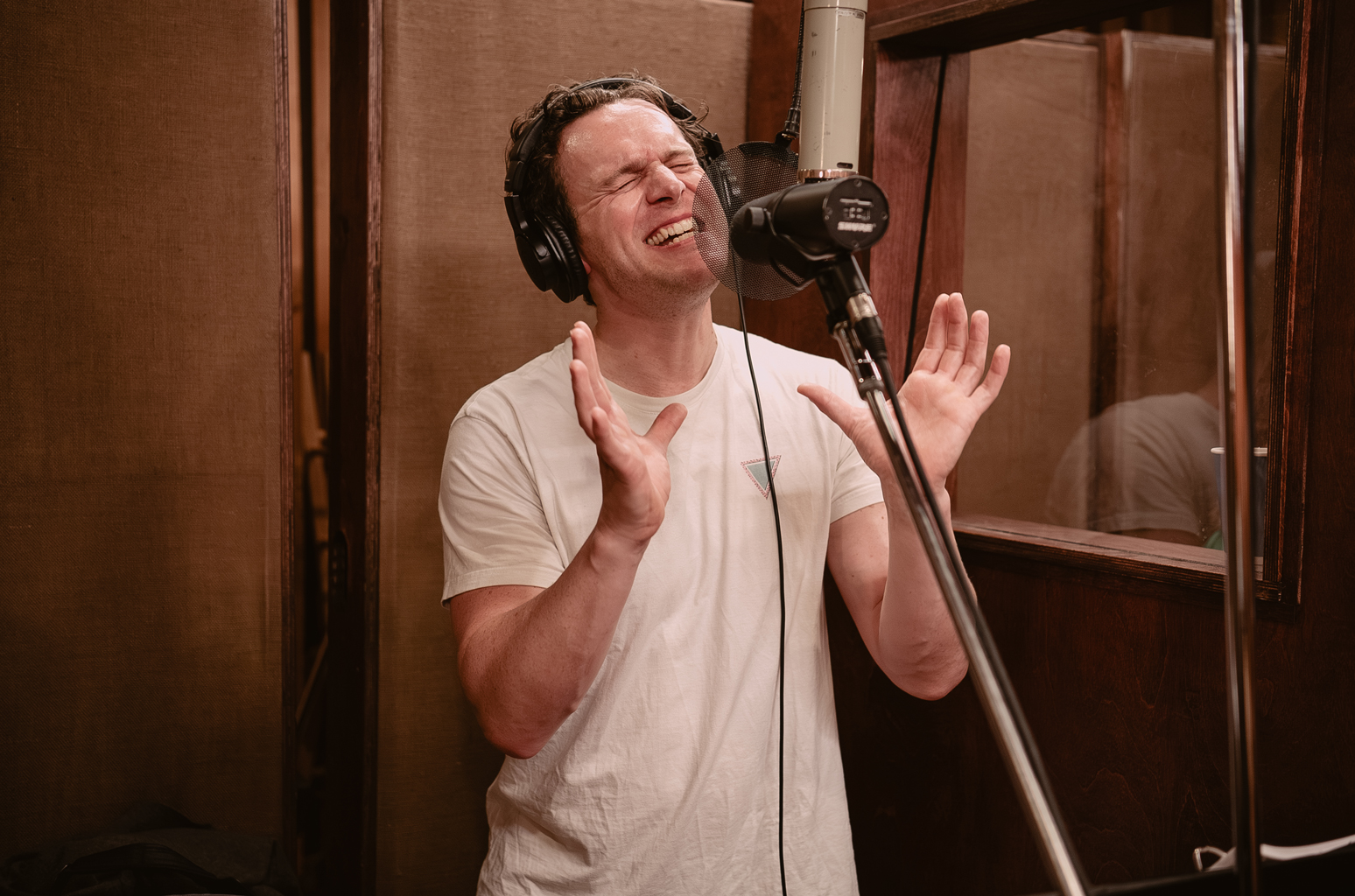
Jonathan Groff and Gracie Lawrence for JUST IN TIME
Michaelah Reynolds

Atlantic Records will release the original Broadway cast recording of the six-time Tony-nominated Just in Time, the label exclusively tells Billboard. The album of the new musical — featuring Jonathan Groff as star 1960s crooner Bobby Darin, and currently playing at the Circle in the Square Theater — will arrive August 15 on all digital platforms, with physical formats coming October 24.
For Atlantic, the connection with Darin is an especially personal one. “This album felt destined to be made at Atlantic,” say Craig Rosen, evp A&R/label operations and Michael Parker, svp A&R. “Bobby Darin is a key part of our legacy — many of his early hits were produced by our founder, Ahmet Ertegun, and recorded in our original offices.” As both point out, Ertegun is in fact a character in the show, and the Circle in the Square is even located below the label’s current headquarters. “Having Jonathan Groff record vocals here, just as Darin once did, brought everything full circle. We’re proud to help bring these iconic songs to life with this incredible cast and band.”

Jonathan Groff and Gracie Lawrence for JUST IN TIME
Michaelah Reynolds
The album release continues Atlantic’s tradition in more recent years as the label for major OBCRs, including Hamilton, Dear Evan Hansen, Jagged Little Pill, The Notebook and Suffs.
Just in Time transforms the theater into a swinging nightclub, with a live onstage band and Groff holding court as Darin telling his life story. Along with Darin’s hits like “Beyond the Sea,” “Dreamlover” and “Mack the Knife” (all of which were originally released on Atlantic imprint ATCO Records) audiences witness his too-short life as a global star — the inaugural winner of the best new artist Grammy Award — and “nightclub animal,” including his relationships with chart-topper Connie Francis (for whom he started out as a songwriter, played by Gracie Lawrence) and screen star Sandra Dee (Erika Henningsen).
To celebrate the release announcement, two tracks are now available everywhere: “Splish Splash” and “This Could Be the Start of Something Big/Just in Time.”

Jonathan Groff
Michaelah Reynolds
“When Bobby Darin recorded the standard ‘Lazy River’ in 1961, he wanted to present ‘an old sound made new,” say producers Tom Kirdahy and Robert Ahrens. “Working with Atlantic, we are excited to do exactly that as we re-introduce Darin’s catalogue to the world with Andrew Resnick and Michael Thurber’s Drama Desk and Outer Critics Circle award-winning orchestrations, and the performances of Tony Award winner Jonathan Groff and the extraordinary cast of Just in Time.”

In the final trailer for Wicked: For Good, Ariana Grande‘s character learns that a big price comes with being Glinda the Good.
Released on Wednesday (Sept. 24) — about two months before the Wicked sequel finally premieres in theaters on Nov. 21 — the preview shows how the blonde leading lady wrestles with her new role as Oz’s spokeswoman, as Cynthia Erivo‘s Elphaba attempts to expose the Wizard’s evil agenda while living in hiding. At first, Glinda is “obsess-ulated” with the gorgeous gown, tiara and mechanical flying bubble her public-facing life affords her — but everything quickly comes crashing down when she realizes that she’s on the wrong side of history, and that she just might be too late to save her former schoolmate from the wrath of Oz’s brainwashed citizens.
“I’m a public figure now, people expect me to …,” Glinda tells Elphaba at one point, with Dorothy’s fallen house and the Yellow Brick Road visible in the background.
“Lie?” the green-skinned witch cuts in, to which Glinda says defensively, “Be encouraging.”
Grande’s character is less sure of herself when she is confronted by Jonathan Bailey’s Fiyero, who accuses, “You can’t resist this.”
“Who could?” Glinda asks, to which the Winkie prince replies, “You know who could.”
Arriving one year after the first Wicked hit theaters and shattered movie-musical box-office records, For Good will serve as the film adaptation of the second act of the Broadway musical on which the live-actions are based. The soundtrack will also drop on Nov. 21, complete with two brand new songs sung by Grande and Erivo.
As revealed when the tracklist dropped a week prior to the new trailer, the title of Glinda’s bonus song is “The Girl in the Bubble,” while Elphaba’s added balled is called “No Place Like Home.”
Watch the final trailer for Wicked: For Good above.

All products and services featured are independently chosen by editors. However, Billboard may receive a commission on orders placed through its retail links, and the retailer may receive certain auditable data for accounting purposes.
Priscilla Presley was with Elvis Presley for around 14 years before they split; however, the pair had known each other for years before they wed in 1967.
The time in between and following Priscilla and Elvis’ divorce was a tough spot for Priscilla, and one she wasn’t super open about — that is, until now. In her new memoir Softly, As I Leave You: Life After Elvis, the actress shares the difficult but inspiring journey beyond the walls of Graceland post-split with the King, choosing to put herself and her daughter, Lisa Marie Presley, first.
A hardcover version of the book is now on sale and can be purchased now on Amazon for $22.38, while paperback will run you $32. A Kindle version retails for $15.99. If you’re a superfan of Priscilla and the Presley family, you can also snag a signed version of the memoir via Barnes & Noble for $32. The piece makes a great gift for the avid Elvis collector in your life. If you’d rather listen to the memoir, we won’t judge, you can do so with Audible via a subscription which costs $7.95 a month, a price tag less than a physical copy.
A new memoir by Priscilla Presley.
If you didn’t know, Priscilla met Elvis when she was just 14 and he was 24. The singer was serving in the U.S. Army in 1959 in Germany. The pair remained romantically connected for years, even with distance between them and in 1967, they were wed in a simple and very secret ceremony in Las Vegas. While their separation in 1973 was painful for Priscilla, this novel highlights why it was so important for the Naked Gun star to leave.
It seems that Priscilla lost touch with herself throughout her relationship with Elvis. Leaving allowed her to find herself again. Through the book, we are treated to snippets of Priscilla’s life pre- and post-Elvis and how she had to reinvent herself a second time as the single mother after the performer’s death in 1977.
Today, we are taken through how Priscilla was able to transform Graceland into an international destination and helped guide the development of Elvis Presley Enterprises, turning the King’s legacy into a full-on business. If you are an Elvis fan, this gives readers a unique perspective on his life, as told by his ex-wife. It also gives Priscilla’s story more context for those who aren’t too familiar with her life and career.

Calvin Harris‘ former longtime business manager is firing back against bombshell fraud claims, saying he never stole from anybody and that the Scottish DJ willingly agreed to invest in his Los Angeles real estate development project.
Thomas St. John, an entertainment industry-focused accountant who runs the eponymous firm Thomas St. John Group, is currently wrapped up in thorny arbitration proceedings with his former client Harris (Adam Wiles). He’s accused of abusing his access to Harris’ accounts in order to fund his side venture: the construction of a recording studio and office space complex in Hollywood.
Harris claims that St. John tricked him into investing $22.5 million in the project, known as CMNTY Culture Campus, which he says turned out to be a “complete boondoggle” that he “has not received a single penny in return for” — while suggesting that St. John pocketed much of the money for himself.
However, a representative for St. John says in a new statement that the allegations are “categorically false.” The rep denies that St. John engaged in any self-dealing, adding that Harris is one of nine above-board investors who “knowingly signed investment agreements” to get involved in CMNTY Culture.
“Not a single dollar has been misappropriated, all investor entitlements remain intact, and the project continues to advance within the normal entitlement timeline,” says St. John’s rep in the Tuesday (Sept. 23) statement. “We will continue to take every necessary step to set the record straight and to ensure that these malicious, bad-faith attacks are recognized for what they are: entirely without merit.”
While CMNTY Culture was initially designed to house a recording studio and office space, St. John has since shifted the plans and is now developing a residential apartment complex on the same tract of land in Hollywood. According to his rep, the project is proceeding apace and “is expected to approach a $1 billion valuation” upon completion.
“While the entitlement process has naturally taken longer than initially projected due to unprecedented interest, macroeconomic conditions and significant city red tape, it remains firmly within its promised schedule and is now on the verge of securing final entitlements, an important milestone that will unlock substantial value,” adds St. John’s rep.
Thomas St. John Group has offices in Los Angeles, London, Amsterdam and Stockholm. The management firm’s U.S. arm recently filed for bankruptcy, citing hundreds of thousands of dollars in unpaid rent in L.A. and multiple pending legal actions.
One creditor listed in the firm’s bankruptcy papers is Philip Lawrence, a songwriter and producer who made his name collaborating with Bruno Mars. Lawrence used to be a client of St. John’s and at one point invested $10 million from the sale of his catalog into CMNTY Culture Campus, according to court filings in Lawrence’s own personal bankruptcy case.


New Kid and Family Movies in 2025: Calendar of Release Dates (Updating)


Brooklyn Mirage Has Been Quietly Co-Managed by Hedge Fund Manager Axar Capital Amid Reopening Drama
The best sexting apps in 2025


Kid and Family TV Shows in 2025: New Series & Season Premiere Dates (Updating)


Every potential TikTok buyer we know about
iOS 18.4 developer beta released — heres what you can expect


Are You an RSSMasher?


DOGE-ing toward the best Department of Defense ever